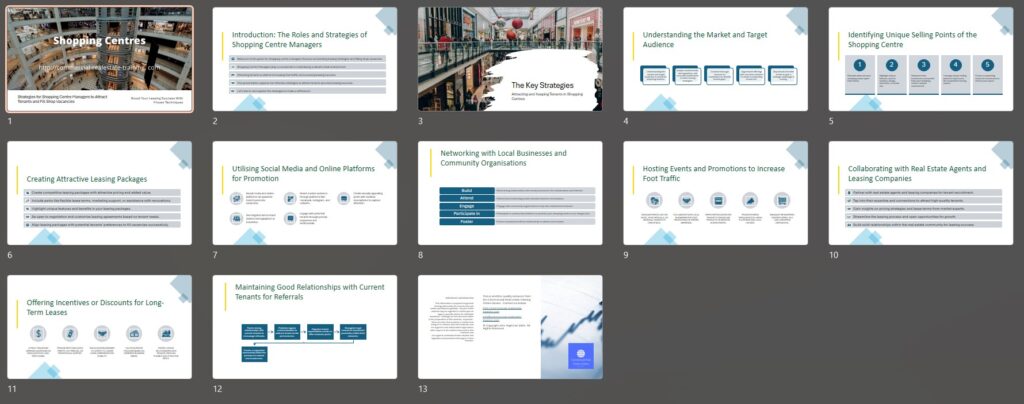Leasing Leverage: Creative Approaches to Attract Tenants to Shopping Centres
Finding tenants to fill vacancies in shopping centres is always an issue. The problem is that there are many shops in a typical shopping centre, and for that reason, there are greater chances of vacancies. Churn happens in shop leasing, so be prepared for it.
If you are a shopping centre owner or manager, here are some strategies for finding tenants and filling upcoming vacancies sooner. I have put the retail leasing strategies in a slide deck. You can get the full slide deck in PDF form for your use.

Looking Ahead and Preparing for Vacancy Potential
One of the biggest challenges in owning a retail shop is dealing with potential vacancies. As much as we want our current tenants to stay forever, there will inevitably come a time when they will move out or close their business. This can be due to factors such as economic downturns, changing consumer behaviour, or personal reasons.
As a retail shopping centre owner or manager, it’s important to always look ahead and prepare for potential vacancies. By doing so, you can minimize the negative impact on your business and ensure that your shop continues to thrive even with tenant turnover.
It is wise to be looking about 18 months ahead in terms of:
- Lease expiry dates
- Tenants moving
- Expansion
- Contraction
- Relocation
- Site consolidation
Slide Deck Download as PDF
Here is a slide deck of ideas as a download to help you build a tenant management plan to reduce vacancies in shopping centres.

Here are some strategies that you can implement to prepare for vacancy potential:
1. Keep an eye on market trends:
It’s crucial to stay informed about the latest market trends in your area. This includes keeping track of the local economy, demographic changes, and competition in your industry. By being aware of these factors, you can anticipate potential shifts that may affect your tenants’ businesses and plan accordingly.
2. Maintain good relationships with current tenants:
The best way to avoid sudden vacancies is by maintaining good relationships with your current tenants. Make sure to communicate regularly with them and address any concerns they may have promptly. Showing genuine care and support for their businesses will make them more likely to renew their lease or refer new tenants to you.
3. Plan for unexpected expenses:
Vacancies mean loss of rental income and additional expenses such as advertising fees and renovations for new tenants. It’s essential to have enough funds set aside expressly for these situations so that you are not caught off guard when a tenant moves out unexpectedly.
What costs should be considered by a shopping centre landlord or centre manager? Fitout changes, leasing fees, lease documentation costs, and renovation programs are common costs of changing and leasing shops and premises today.

4. Diversify your tenant mix:
Having a diverse mix of tenants can help mitigate the risk of losing multiple businesses simultaneously. Consider attracting a variety of retailers rather than solely focusing on one type of business.
Do a full tenant mix review and split the tenants up into retailer, food, and service groups. Then, further split up the tenants into priority groups, such as ranking A, B, and C. Depending on the size of your shopping centre, you can apply that logic to specialty and anchor tenants separately.
5. Stay proactive in marketing efforts:
Don’t wait until there is a vacant space to start marketing for new tenants. Keep your advertising efforts consistent and explore various channels such as social media, local events, and partnerships with other businesses. This will keep your retail shop top of mind for potential tenants.

Preparing and Planning Shop Lease Changes
Preparing for potential vacancies is an essential part of being a successful retail shopping centre owner or manager.
By staying informed about market trends, maintaining good relationships with current tenants, planning for unexpected expenses, diversifying the tenant mix, and staying proactive in marketing efforts, you can minimize the impact of vacancies on your business and ensure its long-term success.






